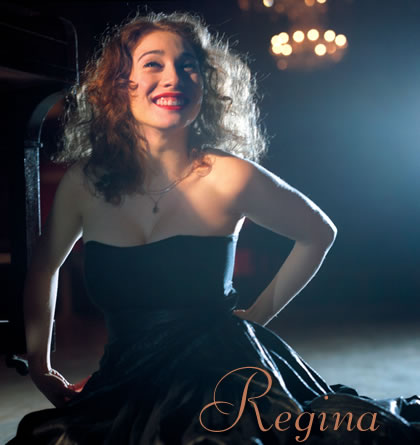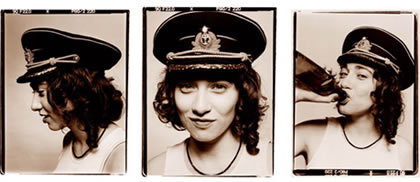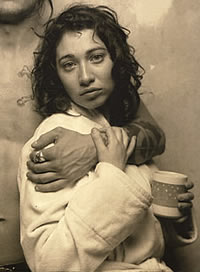
BEGIN TO HOPE • Regina Spektor
When Regina Spektor was nine-and-a-half-years-old, her family emigrated from Moscow to the Bronx to escape Jewish persecution. They were forced to leave the piano, which her grandfather had given her mother when she began the music conservatory at age 16, behind.
"It never started being less sad," Spektor said of the incident in an NPR interview. The one reason her parents thought of staying in Russia was because Spektor had such a great classical piano teacher. Even when her songs are upbeat, sadness is always beneath the surface.
Begin to Hope is Spektor's fourth full-length album and the first to see major distribution. Her first two albums were self-released, as was her third, Soviet Kitsch, until Sire picked it up.
Both a member of the New York City anti-folk collective, whose other recent members include the Moldy Peaches, and classically trained at the SUNY Purchase music conservatory, Spektor's songs reflect these dual influences with each note.
She started piano at age 6 and began to write songs as a teenager while hiking in Israel. Begin to Hope is much more polished than the raw sultriness of her previous works, thanks in part to producer David Kahne, who has worked with Paul McCartney and a long list of greats.
This is not to say that there is less emotion here. The most gushing example comes in track 7, "Après Moi," which begins with the epic Rachmoninoff-styled swelling of minor piano chords. Spektor's voice steps in at about the sixteenth measure with a cabaret voice quickly made distinct with one of her guttural ughs. The piece climaxes as she sings in Russian--lines from a Boris Pasternak poem--the only time on the album in which she uses her mother tongue.
Known to bang on the side of her piano with drumsticks and to begin beat boxing, her performing is highly individual. In Begin to Hope this individualism is refined, not reduced.

Unlike many singer-songwriters, Spektor is adamantly against confessionalism. These are all stories about other people, written like a piece of short fiction.
Her ballads are achingly sad and beautiful, best displayed in "Samson," a twinkly tune played in the upper register. "Samson went back to bed / Not much hair left on his head / Ate a slice of wonder bread and / Went right back to bed / And the history books forgot about us / And the Bible didn't mention us / Not even once."
Mixing literary illusions with popular culture, Spektor's lyrics are as dualistic as her compositions. "Samson" is juxtaposed with "On the Radio," an upbeat melodic tune in which she sings about the Guns 'n' Roses song "November Rain," as it plays on the radio. "That solo's awful long/but it's a good refrain."
Track 10, "Edit," harkens towards a more rhythmic electronic sound. Drum machines pulse. The chorus is merely her repeating "edit, edit, edit, edit," over and over again with a popped t each time. Suddenly a whimsical piano line wisps in.
Spektor is a musician that revels in extreme juxtapositions. In Begin to Hope she balances her classical training with a punk aesthetic, and rolls it all into perfectly hued pop perfection.
• Katy Henriksen
 |
listen to a clips |
| return to covers | |
| buy it here or here | |
| reginaspektor.com | |
| sirerecords.com | |
| puremusic home |